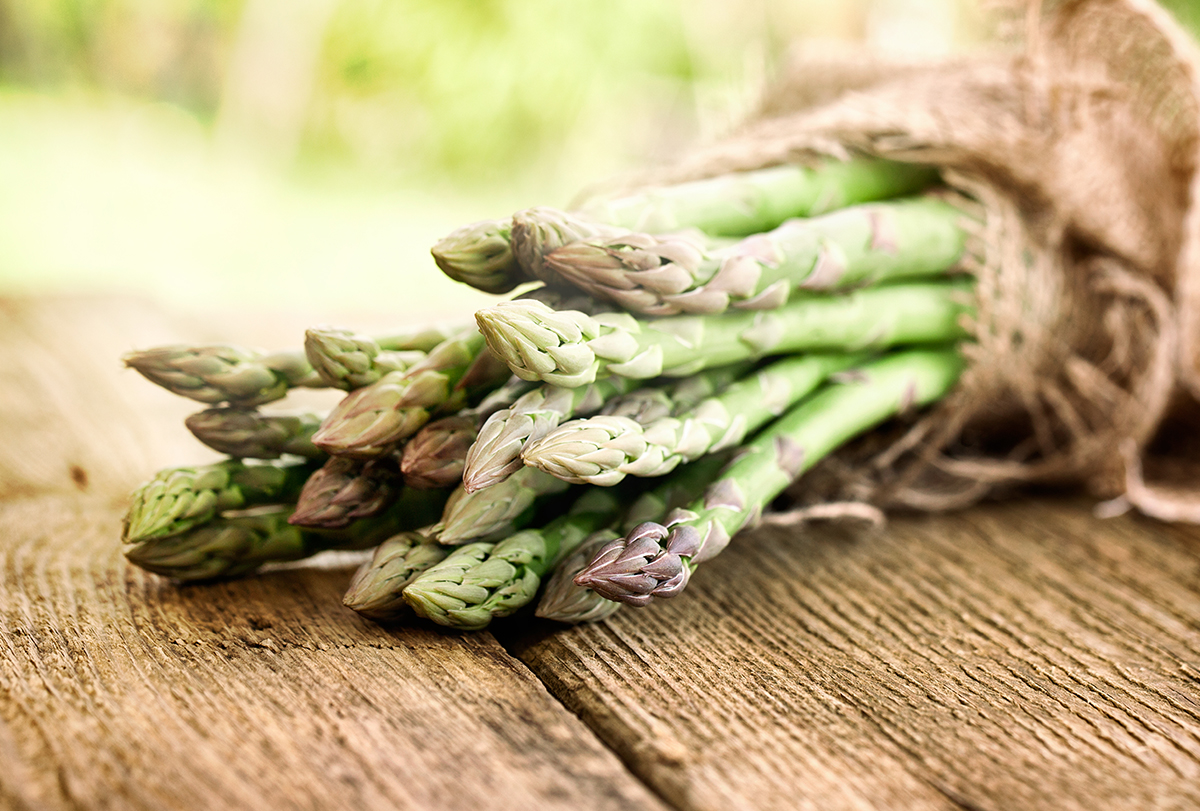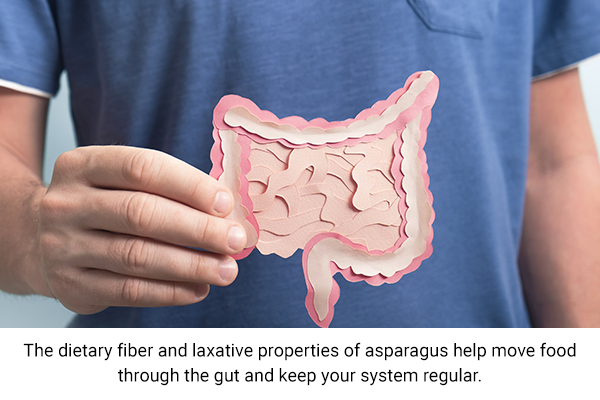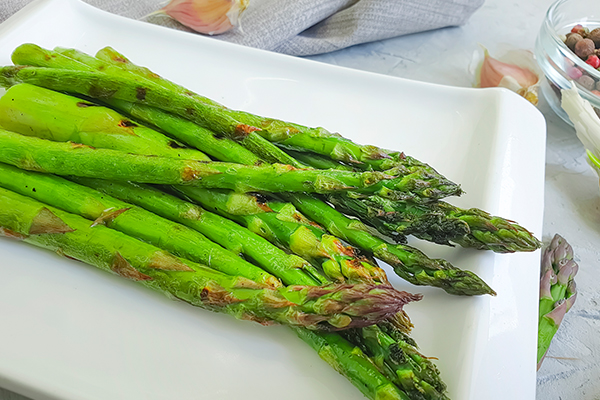In this article:
With the arrival of spring, one vegetable that hits the market is asparagus. It comes in three varieties – green, white, and purple. Green asparagus, popularly known as “sparrow grass” due to its green slender structure, is perhaps the most well-known among all the variants.

Asparagus is akin to vegetables such as garlic, onions, and leek in terms of its distinctively strong flavor and pungent smell, and it was once considered to belong to the same lily family of plants as them.
It was subsequently moved to a family of its own, which goes by the name of Asparagaceae and contains hundreds of varieties of this succulently tender plant. Only some of the asparagus varieties are fit for consumption, however.
This healthy treat is low in calories and sodium, and high in water content. The nutritional value of asparagus is further compounded by its potent anti-inflammatory and antioxidant properties, which account for much of its health-promoting potential.
Advantages of Asparagus
Looking at the many plus sides of asparagus, you simply must include it in your diet.
Here are 10 health benefits of asparagus.
1. Assists digestion

The dietary fiber and laxative properties of asparagus help move food through the gut and keep your system regular. (1)(2) This is a key factor in keeping bloating and constipation at bay.
Plus, this green vegetable contains inulin, a prebiotic that is not broken down and digested until it reaches the large intestine. There, it helps feed the good bacteria already in your digestive system, consequently improving the health of your digestive system and even helping strengthen your immune system.
Its high water content also helps prevent constipation and maintain a healthy digestive tract. However, you should eat asparagus in moderation as it may cause stomach gas.
2. Keeps bones healthy
Being high in vitamin K, asparagus plays a key role in maintaining high bone density. (1)
A study published in Nutrition of Clinical Practice indicates that vitamin K has a positive effect on bone mineral density and decreases fracture risk. (3)
Asparagus even repairs bones and joints damaged by wear and tear. This, in turn, reduces the risk of problems such as osteoporosis and osteoarthritis. (4)(5) Its high iron content also aids in maintaining the strength and elasticity of bones and joints.
Plus, asparagus possesses anti-inflammatory properties that help relieve joint pain commonly associated with arthritis.
3. Supports heart health

The excellent antioxidant and anti-inflammatory properties of asparagus make it highly beneficial for your heart. (6) The vitamin B in asparagus helps maintain healthy levels of homocysteine, which helps prevent serious cardiac disorders.
A study published in Circulation reports that elevated homocysteine levels indicate an increased risk of coronary artery disease and blood clots in the arteries and veins. To lower the elevated levels, folic acid and vitamins B6 and B12 help a lot. (7)
Plus, its vitamin K content supports heart health by preventing the hardening of the arteries and keeping calcium out of the arterial linings. (8)
Being a natural diuretic, this green vegetable is highly beneficial for those who have high blood pressure or other heart-related conditions. It may also interact with blood pressure medication, so discuss with your doctor before increasing your intake.
4. Acts as a brain booster
This delicious spring veggie also helps your brain fight cognitive decline. The high amounts of folate and vitamin B12 in asparagus play a key role in preventing cognitive impairment. (1)
A 2016 study published in JAMA Psychiatry highlights the association between a low vitamin B12 level and brain aging. (9) However, more studies are needed to determine the importance of vitamin B12 supplementation on slowing brain aging in older adults.
An earlier study published in the Annals of Neurosciences demonstrates the neuroprotective effects of Asparagus racemosus root extract in experimental animals as well as human subjects.
Regular intake of asparagus can protect your brain from neurodegenerative diseases that affect the neurons in the brain. Some of these neurodegenerative diseases are Alzheimer’s disease, Parkinson’s disease, and Huntington’s disease.
5. Prevents birth defects

If you are pregnant or trying to conceive, asparagus is one food that you should definitely include in your diet.
Folate is one of the most important nutrients for pregnant women and asparagus is a rich source of this nutrient. (1)
Folate regulates the fetal and embryonic nerve cell formations. It even aids proper formation of nerve cells in the fetus, prevents premature births, and lowers the risk of autistic disorders in babies. (10)
A 2011 study published in the Journal of Pregnancy notes that folic acid intake by all pregnant women would reduce neural tube defects in fetuses by 79%. (11) Plus, the iron in asparagus supports the baby’s overall growth.
6. Regulates blood sugar level
Asparagus is a powerful culinary weapon to keep your blood sugar level under control and manage diabetes.
Asparagus may be helpful in boosting the body’s production of insulin, the hormone that aids the absorption of glucose. It also contains chromium, a trace mineral that enhances insulin’s ability to transport glucose from the bloodstream into cells. (12)
A 2012 study published in the British Journal of Nutrition states that Asparagus officinalis extract controls blood glucose by improving insulin secretion and ß-cell function in streptozotocin-induced type 2 diabetic rats. (13)
7. Serves as a natural diuretic

Asparagus is a great natural diuretic. (14) It promotes urine production, which increases the excretion of excess salt and fluid from the body. This, in turn, reduces the risk of urinary tract infections and other urinary tract conditions.
The diuretic property of asparagus is also beneficial for people who suffer from edema, which is a result of excess accumulation of fluids in the body’s tissues. (15)
Diuretic foods like asparagus help you lose some of the water weight, bloating, and overall sense of discomfort. The diuretic effect may also cause dehydration. Make sure you stay hydrated with water consistently and discuss your condition with your doctor.
8. Maintains healthy vision
Asparagus is also good for your eyes. The vitamin A in it helps your retinas absorb light to process images and send them to the brain. (1) This is essential for healthy vision.
A deficiency of vitamin A can accelerate the onset of age-related vision loss due to the weakening of the retina over time.
Asparagus also contains zeaxanthin, a carotenoid that is good for eye health. Zeaxanthin acts like sunglass filters to protect your eyes from damage due to excessive exposure to the sun’s harmful ultraviolet (UV) rays. (16)
In fact, it plays a protective role against age-related macular degeneration and cataracts.
9. Fights aging

Asparagus even slows down the aging process.
It is rich in vitamin E (1) a lipid-soluble antioxidant that prevents premature signs of aging, such as wrinkles, sagging skin, and fine lines. It even protects tissues from free-radical damage, which keeps your skin looking young and healthy. (17)
Aside from preventing skin aging, asparagus also fights cognitive decline and helps prevent many diseases that come with increasing age.
10. Aids weight loss
Asparagus is a weight-watcher’s delight as it makes one feel satiated without increasing their calorie load.
One hundred grams of asparagus contains no more than 20 calories, which is even lesser than some of the other commonly eaten fruits and vegetables that are touted as diet foods. (1)
Besides its paltry calorie count, asparagus is also a rich source of protein and fiber. On account of these two nutritional components, a small serving of asparagus along with your meals can make you feel satisfied throughout the day and reduce your overall appetite.
11. Can combat premenstrual syndrome (PMS)

Asparagus extract is a godsend for women who are prone to premenstrual syndrome (PMS) such as abdominal bloating, depression, fatigue, and intense menstrual cramps. It has all the right nutrients that can help reduce the intensity of your PMS symptoms. (18)
The heavy loss of blood and hormonal imbalance that occur in the wake of menstruation can also be addressed to a certain degree by this treasured extract, which helps control the loss of blood and maintain a proper hormonal balance during menstruation.
12. Prevents cancer
A leafy green vegetable that is rich in antioxidants, asparagus helps break down carcinogens and other harmful compounds such as free radicals. This reduces the risk of many forms of cancer, such as bone, breast, colon, larynx, and lung cancers. (19) Moreover, it is rich in glutathione, a detoxifying compound that can help destroy carcinogens.
A 2004 study published in the Journal of Nutrition reports that glutathione deficiency contributes to oxidative stress, which plays a key role in aging and the pathogenesis of many diseases, including various cancers. (20)
A 2011 animal study published in the European Journal of Cancer Prevention highlights the cancer chemopreventive efficacy of the roots of Asparagus adscendens when used as a herb. (21)
Another study published in the International Journal of Oncology in 2013 highlights the chemopreventive potential of asparagus shoot extract on colon carcinogenesis and its ability to promote normal cellular homeostasis.
Nutritional Content of Asparagus
No matter the type you choose, asparagus is tasty and delicious to eat. Not only is asparagus delicious, but it is also packed with health benefits, thanks to its nutritional profile.
It contains vitamins including A, B1, B2, B3, B6, C, E, and K. It also contains amino acids and minerals including iron, folic acid, calcium, potassium, zinc, magnesium, manganese, and phosphorus. In addition, it has a good amount of dietary fiber, carbohydrates, and protein.
Nutritional value of raw asparagus per 100 grams: (1)
| Nutrient | Quantity | Amount |
|---|---|---|
| Water | g | 93.22 |
| Energy | kcal | 20 |
| Protein | g | 2.2 |
| Total lipid | g | 0.12 |
| Carbohydrate | g | 3.88 |
| Fiber | g | 2.1 |
| Sugars | g | 1.88 |
| Calcium, Ca | mg | 24 |
| Iron, Fe | mg | 2.14 |
| Magnesium, Mg | mg | 14 |
| Phosphorus, P | mg | 52 |
| Potassium, K | mg | 202 |
| Sodium, Na | mg | 2 |
| Zinc, Zn | mg | 0.54 |
| Vitamin C | mg | 5.6 |
| Thiamin | mg | 0.143 |
| Riboflavin | mg | 0.141 |
| Niacin | mg | 0.978 |
| Vitamin B6 | mg | 0.091 |
| Folate | mcg | 52 |
| Vitamin A | mcg | 38 |
| Vitamin E | mg | 1.13 |
| Vitamin K | mcg | 41.6 |
How to Enjoy Asparagus?

Asparagus can be savored in raw, grilled, or roasted form, all thanks to its mild and appetizing flavor. This versatile ingredient makes for a good addition to a broad range of preparations, including pickles, salads, and soups.
However, asparagus has earned much of its repute as an appetizer or side dish. Asparagus requires minimal cooking to bring out its inherent flavor. Lightly steaming, grilling, stir-frying, and oven roasting are the most preferred cooking methods.
Try these easy-peasy culinary preparations of asparagus:
- If you know how to boil water, you have all the qualification it needs to prepare this particular asparagus recipe. Fill a saucepan with water and bring it to a boil. Tie together a small bundle of the tender asparagus and place it into the boiling water. Allow the asparagus to sit in the boiling water for 5 minutes. Following which, turn the heat off and drain the water from the pan. Enjoy the power boiled asparagus with a plate of steaming rice. The crunch of the asparagus compliments the soft, creamy texture of the rice, making this quite a delectable recipe.
- Alternatively, you can steam the asparagus by placing it into a steam bowl for 5 minutes.
- Yet another mouth-watering preparation involves roasting asparagus for 3–5 minutes and seasoning it with a bit of olive oil, lemon, salt, and pepper to make it even more flavorsome.
- Asparagus can also be used to give your leafy salads a bit of a bite. Stir fry the stalks for a few minutes; squeeze some lemon and add a dash of black salt for a tasty confluence of flavor.
Selecting and Storing Asparagus
If you frequent the grocery stores, you are well aware that there is more than just one type of asparagus. While most people associate the vegetable with the garden-variety green asparagus, the lesser-known white or purple variants are commercially available as well.
Fresh white asparagus is quite a hard find as only a handful of gourmet outlets offer this exclusive veggie. It is most commonly sold in canned form and is generally more exorbitantly priced than its green cousin.
When you go buying asparagus, look for thin, straight, and rounded stalks with deeply colored and closed tips. It is best to opt for a batch with a little woodiness at the base as it prevents the stalk from drying out. However, steer clear of stalks whose cut ends appear too woody.
If you wish to relish this healthy treat for its succulent taste and crunchy bite, consume it within a day or two after purchasing. Asparagus tends to lose about half its total weight after being trimmed and cooked. Bear that in mind when deciding how much to buy so that you don’t run short later.
Precautions and Risk Factors
- One drawback of asparagus is that it can cause a powerful and disagreeable smell in the urine. During digestion, its sulfurous amino acids break down into smelly chemical components, causing the odor in urine.
- Also, the compounds fructans and raffinose present in asparagus may cause abdominal gas.
- Taking asparagus in medicinal amounts is a complete no-no for pregnant women. Given that asparagus extracts have been used for contraception, this activity of the compound can potentially disrupt hormonal balances during pregnancy.
- Asparagus was once considered a part of the Liliaceae family due to several shared characteristics with its other members such as leeks, garlic, onion, and chives. Given the similarities, a person who is allergic to any of the previously mentioned members of the Liliaceae family might react adversely to asparagus.
Final Word
Asparagus makes for a healthy addition to your diet on account of its rich nutritional profile. But a single nutritious food cannot make much of a difference unless it is included in a well-balanced, wholesome diet.
- Was this article helpful?
- YES, THANKS!NOT REALLY


